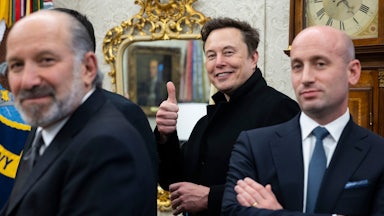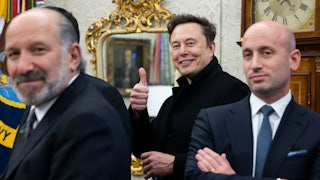Two ballot initiatives in Washington state could overturn the state’s trademark climate law and prevent any local or state government from ever pursuing any type of policies that “discourage” gas stoves and heating. Both campaigns are being championed by Brian Heywood, a hedge fund millionaire who moved from California to Washington to escape taxes. He’s also the principal of “Galt Valley Ranch LLC,” a Redmond, Washington, ranch named for the libertarian hero of Ayn Rand’s Atlas Shrugged.
“Let’s Go Washington,” Heywood’s $8.5 million brainchild, initially collected signatures for a total of six “citizens’ initiatives.” Per state law, those can either be passed by the legislature or put to voters as a ballot initiative. Lawmakers can also draft an alternative measure to appear alongside them. The state’s thoroughly Democratic legislature opted in March to pass three of those into law: a prohibition on raising income taxes; a “parent’s bill of rights”; and an expansion of police’s ability to engage in car chases, including to pursue people with broken taillights. Washingtonians will decide on the other three next week and one more initiative brought onto the slate this past summer. Among those are a bid to overturn Washington’s capital gains tax. Another would require that employees opt in to a tax for funding long-term care.
Ballot Initiative 2117, or I-2117, would ditch the Climate Commitment Act of 2021 and bar lawmakers from enacting any bills like it. The Climate Commitment Act, which took effect in January 2023, established a cap on emissions for large polluters estimated to account for an estimated three-quarters of the state’s greenhouse gas emissions. Companies regulated by the act need to acquire one “allowance” or carbon offset for every metric ton of carbon dioxide equivalent they emit. Over time, the state makes fewer and fewer allowances available, meaning the price of each one rises and polluters have an escalating incentive to cut emissions. By statute, revenue from the sale of those allowances has to be spent on reducing transportation emissions, increasing public transit access, building clean energy, and improving air quality, among other designated project buckets. The CCA is Washington’s main policy tool for meeting the statewide emissions-reduction targets it codified into law in 2008 and updated in 2020, to cut greenhouse gas emissions in half by 2030 and 95 percent by midcentury.
The other climate-related ballot initiative Let’s Go Washington is backing is I-2066, which purports to “stop” a ban on gas stoves and heating that doesn’t currently exist. The initiative—a more recent addition to Let’s Go Washington’s slate—would restrict the state’s energy code from being able to “prohibit, penalize, or discourage” gas hookups for cooking and heating and preempt cities, towns, and state agencies’ ability to enact their own restrictions on gas in new and existing buildings. Because of how broadly a word like “discourage” might be interpreted, it could force lawmakers to amend Seattle’s new building emissions performance standard as well as the state’s energy code, which incentivizes electrified new construction. The measure would also specifically repeal sections of a bill passed earlier this year mandating that Washington’s largest power provider, Puget Sound Energy, create a plan for reducing greenhouse gases across its gas and electric utility business.
While the Climate Commitment Act is generally understood to be a critical means of meeting the state’s climate goals, there isn’t yet evidence as to how much it’s reduced emissions; Washington has not released greenhouse gas emissions data since it went into effect last year. If it passes, I-2066 could make meeting climate goals enormously difficult. The buildings sector is Washington’s second-highest-emitting sector overall. Gas-powered heating accounts for about half of those emissions, and 90 percent in Seattle.
Although the climate stakes for both ballot initiatives are huge, there’s a yawning gap between the amount of attention and resources those campaigns are receiving. The “No on 2117” campaign, which aims to preserve the Climate Commitment Act, is outspending Let’s Go Washington overall, having amassed $12.7 million from some of Washington’s—and the country’s—biggest companies. The campaign to defeat I-2066 so that towns can discourage gas hookups if so inclined has raised less than $300,000. Recent polling, accordingly, suggests I-2117 might fail and I-2066 could pass. Just 30 percent of voters surveyed by local NBC affiliate KING 5 say they would vote for I-2177; 44 percent say they would vote for I-2066. It might be the only one of Let’s Go Washington’s ballot initiatives that passes.
The Seattle Times recommended voting down the Climate Commitment Act repeal but endorsed Let’s Go Washington’s gas initiative. “A split outcome could mean that Washington state’s emissions cap stays on the books but Washingtonians lose a policy that curbs emissions,” says Emily Moore, director of the climate and energy program at the Sightline Institute, a nonpartisan environmental think tank focused on the Pacific Northwest. Puget Sound Energy, for instance, “could keep paying to pollute to comply with the Climate Commitment Act without actually cutting their emissions.”
Donors to political action committees opposing I-2117 include big green groups like the Nature Conservancy, the Environmental Defense Fund, and the League of Conservation Voters Action Fund as well as several labor unions. Among the biggest spenders, though, are multinational corporations. BP America has given $2 million to the campaign to preserve the Climate Commitment Act and defeat I-2117 this year, and a number of smaller in-kind donations. Amazon has given $1 million, while Microsoft has contributed $1 million. Its founder, Bill Gates, has personally put $1 million toward that cause. Salesforce and REI Co-op have given handsomely too.
It may seem strange that BP and Amazon are joining forces with REI and environmentalists to try to defend a climate law. But this odd-bedfellows coalition mirrors the one that first worked to pass the Climate Commitment Act in 2021; that battle enlisted the enthusiastic support of BP, the Nature Conservancy, and organized labor. Several climate and environmental justice groups criticized that push, wary both of the dubious research on carbon offsets and an oil and gas company’s involvement in drafting the bill.
Despite environmentalists’ reservations about the Climate Commitment Act, they’re strongly opposed to Let’s Go Washington’s efforts to repeal it, via I-2117. Many resent a right-wing millionaire’s effort to warp state politics and also note that the the cap-and-invest program has already invested nearly $2 billion in projects ranging from free bus transit for Washingtonians under 19 to floodplain conservation, ferries, and solar resilience hubs. If I-2117 prevails at the ballot box, there’ll be no alternative funding source for those initiatives. Among those is Front and Centered, a coalition of climate and environmental justice groups that opposed the Climate Commitment Act in 2021.
“2117 is moving a lot of money around, and 2066 is not,” says Front and Centered co-executive director Deric Gruen. The latter, he adds, is “fundamentally about the guaranteed use of fossil fuels, and those are different fights. They attract different things for different reasons.”
The “No on 2066” campaign—trying to preserve state and local governments’ options for encouraging electrification and energy efficiency—is comparatively scrappy, consisting of the nonprofits Washington Conservation Action, Climate Solutions, and Rewiring America, the latter based in Washington D.C. REI also contributed $50,000 in late October. A broader coalition called Defend Washington—backed by some of the state’s biggest unions—is also fighting the full suite of Let’s Go Washington’s ballot initiatives, including 2066. According to Heatmap’s Jeva Lange, “several major national green groups, including Defenders of Wildlife and the Environmental Defense Action Fund,” which endorsed No on I-2117, had “not considered a position on I-2066.”
That’s in part thanks to timing: I-2066 was not initially part of the slate Let’s Go Washington was pushing, and was only added in July. Although Heywood is the public face of all of Washington’s reactionary ballot initiatives, Let’s Go Washington has only become involved in the I-2066 push more recently. Its largest backers have been the Building Industry Association of Washington Member Services Corporation—the for-profit arm of a trade association for the state’s housing industry—and its political action committee, Main Street Matters to Washington. Together, they’ve given $2.55 million to Let’s Go Washington. Other major contributors include gas utilities and building trades unions that work on gas lines and hookups. Gas interests—including Koch Industries, the Pacific Propane Gas Association, the NW Hearth Patio and Barbecue Association—have also donated generously to Main Street Matters. Donors to Let’s Go Washington also include an Oregon-based group called NW Coalition for Energy Choice, which is funded by gas utilities throughout the Pacific Northwest. Those utilities, in turn, are funded by their customers, meaning that the same ratepayers are inadvertently funding efforts to indefinitely saddle them with gas stoves and heating.
It’s not all that difficult to figure out why real estate and gas interests are enthusiastic about halting Washington’s progress toward building decarbonization: At least in the short term, it’d cost them more money. Why, though, are companies like Amazon and Microsoft pouring so much money into preserving the state’s climate law?
Like most tech companies, both Amazon and Microsoft donate more to Democrats than Republicans. Yet they aren’t exactly stalwart progressives. Amazon is funding a PAC with ties to prominent Republicans that’s running inflammatory ads in Central Washington to block three Democrats’ bids for the state legislature. Under pressure to account for the ballooning carbon footprint of their artificial intelligence ventures, though, Microsoft and Amazon each have a specific and potentially not unrelated interest in seeing carbon markets succeed. Even as they look to small modular nuclear reactors and geothermal to provide power for a growing fleet of data centers, many of those technologies aren’t likely to come online for years. Carbon offsets can offer a temporary fix.
In June, Microsoft signed a deal with BTG Pactual Timberland Investment Group to purchase eight million tons of carbon-removal credits through 2043, corresponding to the latter’s reforestation and restoration plans in Latin America. Amazon similarly announced in September that it’d join several other companies in the LEAF Coalition it spearheads to purchase $180 million worth of carbon-offset credits to be generated in the Brazilian state of Pará. BP’s reliance on offsets, meanwhile, has come under additional scrutiny in recent months. An investigation published this past summer revealed that a substantial number of credits issued by the BP-owned carbon-offsetting firm Finite Carbon were sold on the promise of “protecting” forests that were likely never in danger. The offsets ratings agency Renoster and the nonprofit CarbonPlan analyzed three projects accounting for nearly half of Finite Carbon’s total credits; they found that about 79 percent should not have been issued. The Nature Conservancy, meanwhile, has its own portfolio of carbon-offset projects that have been plagued by controversies.
It’s worth noting that Washington does have relatively strict guardrails around how and when offsets can be used as part of its cap and invest system: Companies can’t buy them to make up for emissions that exceed the state’s carbon cap, for instance. Offset credits can also only be used to cover up to 5 percent of a company’s total emissions.
Two things can be true at the same time. Those eager to keep Washington politics from being upended by rich libertarians will understandably welcome the millions that Amazon, Microsoft, and BP are spending to beat I-2117. Still, those donations shouldn’t be seen as purely altruistic. Arguably the most disturbing aspect of the Let’s Go Washington ordeal is how much Brian Heywood and his ilk have already won. Months ago, a solidly Democratic state legislature passed legislation that’s been championed by some of the country’s farthest-right politicians. Come Tuesday, realtors and fossil fuel interests may yet succeed in passing one of the country’s most sweeping bans on building decarbonization. If that happens—and even if it doesn’t—Heywood’s reactionary crusade will almost certainly be seen as a lesson for other right-wingers with excess cash: Throw a bunch of stuff at the wall, however blue the state, and at least some of it will stick.








